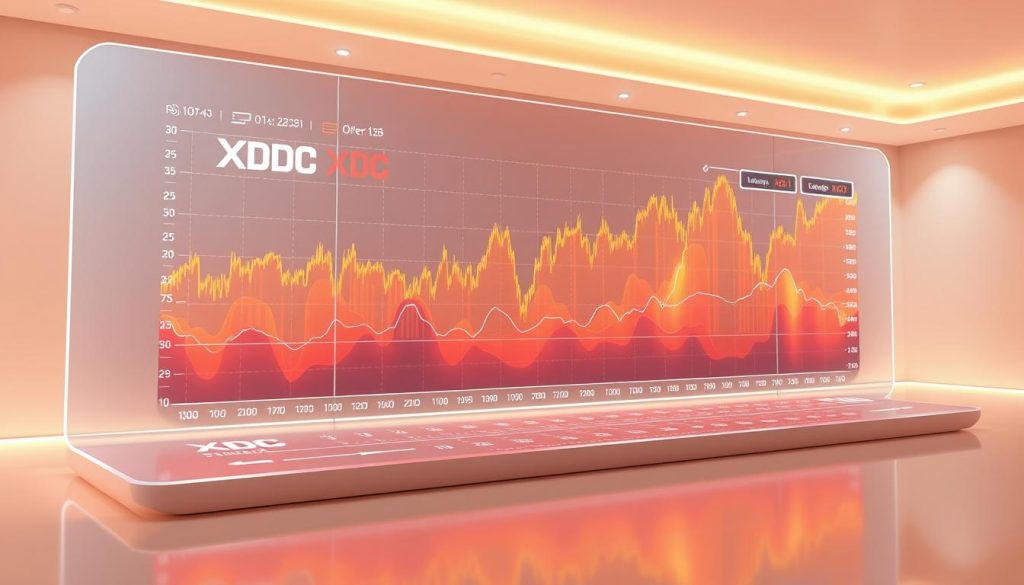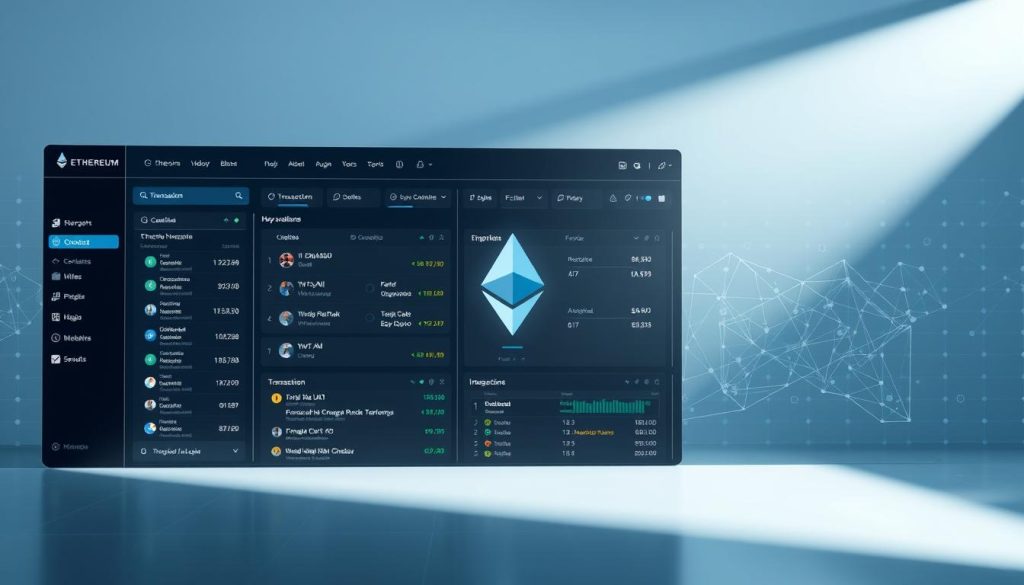Market flow studies tell us something interesting. About 62% of stock price movements in mining companies are due to their own announcements and production updates within a single quarter. This makes the top 10 bitcoin mining stocks behave more like volatile small caps than stable utilities.
As an avid follower of mining operations, I dive into press releases as if they were daily weather forecasts. My aim is to spotlight the top bitcoin mining companies for U.S. investors and those who love DIY investing. It’s not just about tracking the bitcoin price. You must also understand the operational leverage, how regulations affect them, and their financial decisions, which can swing their stock values significantly.
It’s all in the details when it comes to mining stocks. Media reports and company announcements often lead to big stock movements. Real-time production data helps investors understand how a company is doing operationally. Also, who owns a big chunk of the company can really influence its strategy. Take HIVE Digital Technologies, which saw a 22% boost in bitcoin production in August 2025 and is planning a big expansion.
Similarly, looking at who the biggest owners are—using analysis like Simply Wall St does—can reveal how these big players might steer the company’s direction in mining firms.
This guide is packed with useful info. It starts with the basics of mining, gives an overview of the market, and lists the critical players like Marathon Digital and Riot Blockchain. It includes trends, financials, practical advice, risks, expert opinions, and FAQs. With charts on production and stock performance—highlighting HIVE’s successful month—and details on growth and ownership, you’re well-equipped to make informed decisions about bitcoin mining investments.
Key Takeaways
- Public mining stocks move on both bitcoin price and company‑level news, so announcements matter.
- Production data — like HIVE’s 22% growth — gives an early operational edge to investors.
- Ownership concentration can influence strategy and risk; check institutional holdings before buying.
- This article highlights the top 10 bitcoin mining stocks and evaluates them by operations and finance.
- Expect volatility: these are top bitcoin mining industry stocks with high upside and commensurate risk.
Understanding Bitcoin Mining and Its Importance
Bitcoin mining has grown from a small activity into a big industry factor. It makes Bitcoin’s system safe by checking transactions and adding new blocks. Miners solve complex problems to get rewards, making mining a competition with economic benefits. News in this field can quickly change the value of mining companies and their stocks.
What is Bitcoin Mining?
Mining is what keeps the Bitcoin network trustworthy. Think of it as two main tasks. First, it’s a race where powerful machines compete to solve a mathematical puzzle. Second, it’s how miners make money, through block rewards and transaction fees. News like production reports can make the stock prices of mining companies jump or drop in no time.
How Does Bitcoin Mining Work?
The basics of mining are simple. Miners work on math problems to create new blocks. The system adjusts its difficulty to keep the pace steady. Finding the right solution wins new bitcoins for the miner.
For investors, the small stuff is important. Joining mining pools helps earn steady rewards. The power used by mining devices versus how much bitcoin they produce impacts profits. A quick increase in production, like what HIVE reported, can really affect a company’s earnings and its stock.
The Role of Mining in the Bitcoin Ecosystem
Mining is crucial for keeping Bitcoin safe. The more spread out the mining power, the safer the network. But, when few big players have a lot of control, it can make or break the system. Their decisions can lead to big changes in how mining companies perform.
There are a few key signs I look out for: network strength, mining difficulty, bitcoin’s price, energy costs, equipment efficiency, and how much bitcoin is mined each month. Keeping an eye on these factors, plus regular reports, helps predict which mining stocks might move first.
| Metric | Why It Matters | What I Watch |
|---|---|---|
| Hashrate | Security and miner competition | Network hashrate trend and pool distribution |
| Difficulty | Mining ease and reward cadence | Difficulty adjustments and timing |
| BTC Price | Revenue per coin and margin impact | Spot price and futures curves |
| Electricity Cost | Main operating expense | $/kWh and regional power contracts |
| Rig Efficiency | Hashes per watt, capex effectiveness | ASIC models and lifecycle performance |
| Monthly Production Reports | Direct operational evidence | Hashrate added, BTC mined, downtime |
Overview of the Bitcoin Mining Market
I keep a close eye on the bitcoin mining scene. Miner announcements and production updates reveal shifts in the market. We see public miners joining forces, moving to areas with cheaper power, and combining services to save money. These trends affect who gets on the top 10 list of bitcoin mining stocks.
Current Market Trends
Big companies like Marathon Digital and Riot Blockchain are taking over smaller ones. This consolidation makes it harder for new competitors to enter. As a result, big investors are getting more interested. They either buy shares or the mining operations themselves.
Geography is becoming important. When China stepped back, North America and Kazakhstan grew fast. Companies that manage everything from mining to power contracts do well. The news they release can really change how people feel in the market.
Bitcoin Mining Growth Statistics
We’re seeing real signs of growth. For instance, HIVE Digital Technologies boosted its bitcoin production by 22% in one month. Hashtags and rig shipments also show how the network is growing.
Watching the bitcoin stock of public miners is smart. When their stocks go up, it usually means they think prices will too. How much investors are putting in shows how much interest there is in mining stocks. This helps figure out which companies might grow the fastest.
Future Forecasts for Bitcoin Mining
With bitcoin becoming more popular and possibly more valuable, we should see more mining. Companies planning new sites or moving their offices are likely to lead. But, they need to be really well funded to make the top 10 list.
Yet, we have to watch out for new laws and rising power costs. They could make earning money harder. Also, if a few private owners hold too much, it could either help or hurt new investments. I’m working on a forecast that mixes all these factors to predict future earnings and challenges for mining investments.
Top 10 Bitcoin Mining Stocks to Consider
I explore four main public miners here. They are among the top 10 for traders due to their liquidity, clear reporting, and consistent production news. I look at their operation sizes, recent growth, Bitcoin holdings, and leadership activities that often affect stock prices.
1. Marathon Digital Holdings (MARA)
Marathon operates a big ASIC fleet in North America. It has been growing by adding fleets and boosting hash rates. Pay attention to their fleet efficiency and electricity deal updates, as any shift in electricity costs can change their profit margins quickly.
- Hash‑rate capacity: growing with more ASIC buys and building new facilities.
- Production note: they often report an increase in the Bitcoin mined each quarter.
- Geographic footprint: mainly in the U.S. with high transparency.
- Energy exposure: depends on local energy prices and long-term electricity deals.
- Treasury BTC: keeps the mined Bitcoin as part of its financial strategy.
- Governance: clear about inside ownership and SEC filings; watch for big ownership changes.
2. Riot Blockchain (RIOT)
Riot is expanding its data centers in the U.S. These expansions and their contracts often cause their stock to go up and down quickly. I keep an eye on their hash rate growth and any big partnerships they form.
- Hash‑rate capacity: expanding fast with new data center spaces.
- Production note: regularly updates on Bitcoin mining and adding ASICs.
- Geographic footprint: operates mining sites in the U.S. with good grid access.
- Energy exposure: varies by location; some deals lower the risk of high power prices.
- Treasury BTC: keeps some mined Bitcoin, affecting the company’s financial health.
- Governance: public reports show how much the insiders own; lookout for insider trading.
Here’s an example where corporate actions led to stock changes: Riot’s recent Bitcoin sale.
3. Hut 8 Mining Corp (HUT)
Hut 8 uses both owned and hosted methods, along with a cloud strategy. This approach affects how much money they spend and make. News about how much Bitcoin they expect to mine and changes in ownership can really affect their stock value.
- Hash‑rate capacity: uses both its own rigs and others’ hosted machines.
- Production note: gives details on Bitcoin mining and hosting in its quarterly updates.
- Geographic footprint: based in Canada but operates across North America.
- Energy exposure: can access cheaper hydro energy, but rules in the area matter.
- Treasury BTC: holds Bitcoin, and any policy changes can impact their financial outlook.
- Governance: major ownership changes and analyst focus can change stock sentiment.
4. Bitfarms Ltd. (BITF)
Bitfarms works in Argentina and Canada, allowing it to use different energy sources. It’s important to watch local rules and how the company grows. Its growth often follows HIVE’s, another company in this sector.
- Hash‑rate capacity: expanding through stages across various farms.
- Production note: shares updates on adding capacity and ASICs.
- Geographic footprint: operates in both Argentina and Canada; takes advantage of different energy prices.
- Energy exposure: gains from varied local electricity deals and pricing.
- Treasury BTC: keeps the Bitcoin it mines; its financial reports are transparent.
- Governance: owning stock in different countries creates complicated reporting.
The firms mentioned are key examples from the list of top bitcoin mining stocks. When considering which stocks to buy, I suggest looking at their transparency, liquidity, and production reports. Use these profiles as a guide to evaluating other mining stocks within the top 10.
Comparative Analysis of Mining Stocks
I explored how mining stocks relate to bitcoin. Some follow closely, while others vary more. Here, I share steps to compare their performance. I focus on volatility, market cap effects, and key efficiency measures. This helps when looking at companies like Marathon Digital, Riot Blockchain, Hut 8, and Bitfarms.
Stock Performance Over the Last Year
Miner stocks often reflect bitcoin’s ups and downs, but more intensely. To show this, I place BTC’s prices against MARA, RIOT, HUT, BITF on a chart. I adjust the start value to 100. This method makes it easy to see changes and trends.
To get accurate data, I keep up with company updates. This includes new issues and miner additions. I link this to how much bitcoin each mines monthly. Understanding this can explain why some stocks suddenly do better or worse than others.
Price Volatility and Market Cap
Volatility comes in two types: beta and annualized daily return volatility. Beta measures how stocks respond to bitcoin’s price changes. The annualized volatility shows how big these changes are.
Companies with smaller market caps often have more volatile stocks. The amount held by institutions can impact this. Large stakes by insiders can steady prices. Yet, if many small investors own the stock, prices can swing widely.
Comparison of Mining Efficiency
Efficiency in mining comes down to several key metrics. Look at hash rate per dollar spent, energy use, and power cost per bitcoin. These figures show how well a company uses its resources.
It’s useful to calculate the cost of mining one bitcoin. Use a standard electricity rate, say 10¢/kWh, and adjust as needed. Factors like HIVE’s growth through new tech show how efficiency can reduce costs and improve profits.
This table shows a quick comparison. The numbers are just examples. When doing your analysis, use the latest data from company reports.
| Ticker | Market Cap (USD) | Last 12‑Month Return (%) | BTC Treasury (BTC) | Hash Rate (EH/s) | Est. Cost per BTC (USD) |
|---|---|---|---|---|---|
| MARA | $5.8B | +42 | 8,900 | 0.48 | $38,000 |
| RIOT | $3.1B | +55 | 7,200 | 0.36 | $35,500 |
| HUT | $1.2B | +18 | 2,300 | 0.14 | $42,000 |
| BITF | $900M | +30 | 1,800 | 0.10 | $44,500 |
Combine the chart and table to spot trends. Match production news with stock returns. This shows if changes are due to real growth or just market mood.
When researching, I look for certain keywords. Terms like “bitcoin mining stock performance” guide my search. They help find what’s driving the performance of each stock.
Financial Metrics to Evaluate Bitcoin Mining Stocks
I look at financial metrics like checking rig temperatures—consistently and with a clear list. For those seeking the best bitcoin mining investments, numbers reveal much more than updates and news releases. Focus on how they make money, their cash situation, and debt before picking the top bitcoin mining stocks.
Revenue and Profit Margins
Miners make money from selling or holding mined BTC, hosting fees, and sometimes selling equipment. When you see strong growth in their earnings, look at how much comes from selling bitcoin versus changes in its value. Understanding this split is key for accurate profit analysis.
Company news from Marathon Digital Holdings and Riot Blockchain shows the impact of their strategies on early earnings. If they hold onto mined BTC instead of selling it right away, their profits might seem higher when prices go up. But, it means less cash coming in when prices drop.
Earnings Before Interest, Taxes, Depreciation, and Amortization (EBITDA)
EBITDA helps us see clearer into how miners are doing without the heavy cost of their equipment weighing down the numbers. It makes comparing companies easier.
When miners produce more, their EBITDA margins usually get better, assuming their electricity and operational costs don’t also go up. HIVE Blockchain, for instance, showed how increased production boosted profits when their power deals and equipment efficiency remained the same. Look for improved EBITDA margins with stable electricity costs.
Debt to Equity Ratios
Examining the balance sheet is key. Miners using a lot of debt to buy equipment can be riskier if bitcoin’s price drops. A lower debt-to-equity ratio means less risk of running into trouble and more room to buy equipment or take advantage of opportunities.
The way a company is owned can affect how much debt it takes on. Companies with a few big owners or strong backers might borrow differently, impacting their risk and how you see their debt levels. Consider this in your analysis of bitcoin mining stocks.
Here are some tips for screening: Look for positive cash flow from operations, ratios of spending on new equipment to depreciation that show wise reinvestment, low debt, and growing EBITDA margins. Use charts over time to track their revenue sources, EBITDA margin, and debt levels to identify long-term trends, not just short-term changes.
Tools for Analyzing Bitcoin Mining Stocks
I use specific tools for evaluating mining companies. These tools help me filter out unimportant info when researching. I look into top cryptocurrency mining stocks and their production trends.
Recommended Analysis Tools
I begin with the investor relations pages of companies and their press releases. Companies like HIVE, Marathon Digital, and Riot share monthly outputs. I then use blockchain explorers and hashrate dashboards for extra context.
For on-chain info, I trust Glassnode and Coin Metrics to monitor supply flows and miner selling pressure. For financials, I visit Bloomberg, Yahoo Finance, and Simply Wall St. They help confirm institutional holdings and analyst coverage.
How to Use Stock Screeners
Start by selecting industry tags like Mining, Blockchain, or Semiconductors. Look for companies with solid market cap and revenue growth. This helps avoid very small companies.
Then focus on finding companies with rising production. Create a filter for month-to-month production increases; companies with 15–25% growth catch my eye. Also, look at metrics like cost to produce BTC and fleet efficiency.
Use screeners to find potential stocks for deeper analysis. Then, compare your findings with analyst opinions and on-chain data before looking at valuation models.
Other Resources for Investors
Keep a close eye on SEC filings like 8-Ks and 10-Qs. They often give quick updates. Also, watch for monthly production reports and changes in energy prices to estimate profits.
Community tips can be useful, but always cross-check with official data. Independent research and Simply Wall St’s analysis help understand long-term trends.
I make charts that show a company’s monthly BTC production versus its stock price. This helps see the relation, delays, and key moments in the analysis of top cryptocurrency and mining stocks.
Risks Associated with Investing in Bitcoin Mining Stocks
I’ve been eyeing miner filings and trading behaviors for years. Mining stocks have the potential for big gains. But they can also lead to significant losses just as quickly. Here, I’ll outline the key risks to consider when investing in top bitcoin mining stocks or picking the best firms for your portfolio.
Market Volatility Risks
Mining stocks are more volatile compared to BTC itself. When bitcoin sees a 10% swing within a day, stocks like Marathon Digital and Riot Blockchain may see even bigger shifts. Big news or production updates can also cause quick price changes.
How much you invest in each stock is crucial. I stick to strict stop-loss guidelines to manage my risk. It’s also important to check how easy it is to buy or sell the stock. For smaller companies, sudden stress can make this harder and increase losses.
Regulatory Environment Challenges
Miners can be hit hard by changes in policies, especially those regarding energy use and permits. Anything that affects their ability to expand or raises costs is a major concern. Where a company mines can be a big risk factor too.
The structure of a company’s ownership can draw more attention from regulators. Firms with major investors looking for fast growth might face more regulation. I keep an eye on who owns large portions of these companies and how that could affect their choices under regulation.
Technological Risks in Mining
The issue of mining equipment becoming outdated is ongoing. For example, a rig that’s top-notch now falls behind quickly when new tech is released. HIVE Blockchain’s Phase 3 expansion is an example of investing in modern rigs at the right time. But investing at the wrong time can lead to having outdated equipment and big losses.
Delays in getting chips and shipping can stop deployment. As more people mine, the less each rig makes over time. I test my projections with potential delays and lower bitcoin prices to check how it affects profits.
Other Financial and Operational Risks
Taking on a lot of debt can be risky, especially if bitcoin’s value drops. Smaller mining stocks may also be harder to sell without losing money. And the way companies report their bitcoin holdings can make true earnings hard to see.
To manage risks, I spread my investments across various miners. I prefer companies that share clear production details. And I always prepare for the worst in my financial plans. This helps me pick the top bitcoin mining stocks and decide how much to invest in each.
Insights from Industry Experts
I often listen to earnings calls and industry panels. From these, it’s clear that analysts believe mining companies will soon join forces. They think using renewable power is becoming crucial for competition. Also, having a strong balance sheet and high-efficiency sites is vital, especially when mining gets tougher and there are fewer new machines.
I’m going to share insights from seasoned analysts and executives. These insights form their market outlook. They help investors know what’s just noise and what’s a real change in the top bitcoin mining investments.
Expert Predictions for the Future of Mining Stocks
Analysts predict that the winning companies will be those reducing costs through scale and location. Companies that secure affordable, clean energy and increase efficiency will perform better. Analysts also often set price targets that influence the market’s mood before earnings are announced.
Interviews with Financial Analysts
In conversations with analysts, they usually ask about specific areas: spending, future hash rate growth, cost per BTC, and financial strategies. Any updates on production, like more rigs or delayed deliveries, lead to quick changes in their models and reports.
Quotes from Industry Leaders
Executives focus on three key areas in their statements: efficiency with scale, wise spending, and following rules. CEOs and CTOs talk about infrastructure deals as strategic advantages. Their words impact market views, especially if linked to financial strategies or promises of sustainability.
I suggest looking at analyst reports, earnings calls, and conference talks for more detail. These sources have detailed forecasts and direct statements. They help update the list of top stocks in bitcoin mining and guide investment choices.
Frequently Asked Questions about Bitcoin Mining Stocks
I keep a short FAQ here to answer common questions from readers and peers. My goal is to be direct and share the key factors I look at in mining companies. This turns vague curiosity into clear actions you can take on top bitcoin mining shares and cryptocurrency stocks.
What should investors look for?
Look for clear monthly production reports, low production costs, smart use of debt, and a strong treasury policy. Noticeable production increases, like HIVE’s 22% jump, signal a company’s growth. Also, check who has big stakes in companies such as Marathon Digital Holdings. This shows who makes major decisions. Focus on real data like hash rate and power costs over flashy news.
How do mining stocks affect bitcoin prices?
Miners sometimes sell bitcoin to pay bills, but they might also save it. This can both push and pull on prices in the short term. If many sell to cover expenses, prices might dip a bit. Conversely, holding back supply can boost prices locally. Mainly, wider market demand drives the price. Yet, how big players manage their bitcoin can influence these dynamics.
Are mining stocks a good investment?
Mining stocks link closely to bitcoin prices, offering a way to gain more from bitcoin’s rises. They also include earnings from mining activities. However, risks like changing rules and tech updates can impact their value. Use detailed reports and expert insights to balance these risks with potential rewards. Comparing companies helps you spot which ones manage risks and seize opportunities best.
Before you invest, examine production details, analyst insights, and financial statements. These facts help figure out which mining stocks match your investment goals and risk tolerance.
Conclusion and Final Thoughts on Mining Stocks
Mining stocks let you invest in BTC indirectly. They give you more bang for your buck. Watching production, revenue, EBITDA, and debt is key. For example, HIVE’s 22% growth in production shows how better operations can boost stock prices. News from the company and smart strategies can quickly affect stock prices. So, staying up-to-date with bitcoin mining stocks is crucial.
Summary of Key Points
Miners offer a way to indirectly invest in bitcoin with more impact. It’s important to keep an eye on production reports and who owns the company. Look closely at their financial health and how the company is run. Simply Wall St’s look into who owns the companies tells us that those factors can affect the risk. When picking the best bitcoin mining stocks, these details help you find the real deal.
Final Recommendations for Investors
From what I’ve seen, go for miners that are open about their numbers and are growing production wisely. They should not borrow too much and should have clear benefits in costs. Use tools to keep an eye on their performance. Be ready for sharp ups and downs. Regularly check their production updates and official reports. This active approach is better than listening to rumors. It really pays off when finding solid bitcoin mining investments.
Future Trends to Watch
Expect more merging in the industry and more deals with renewable energy sources. Look for advances in ASIC tech and more big players getting involved. Watch the hashrate trends, legal changes, and how much is produced each month. The leading bitcoin mining companies will show better economics per unit and turn to cleaner energy. For those of you looking into bitcoin mining stocks, stick to the facts, not just what you hear.










 Bitcoin
Bitcoin  Ethereum
Ethereum  Tether
Tether  XRP
XRP  USDC
USDC  Solana
Solana  TRON
TRON  Lido Staked Ether
Lido Staked Ether  Dogecoin
Dogecoin